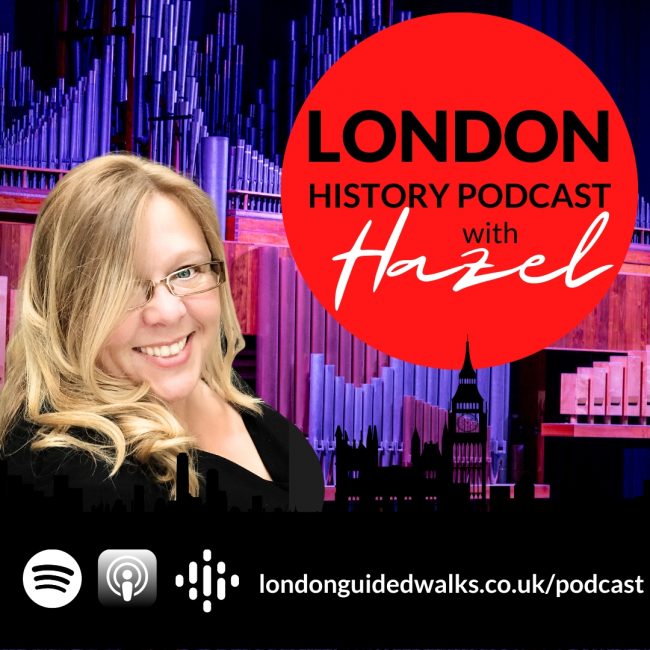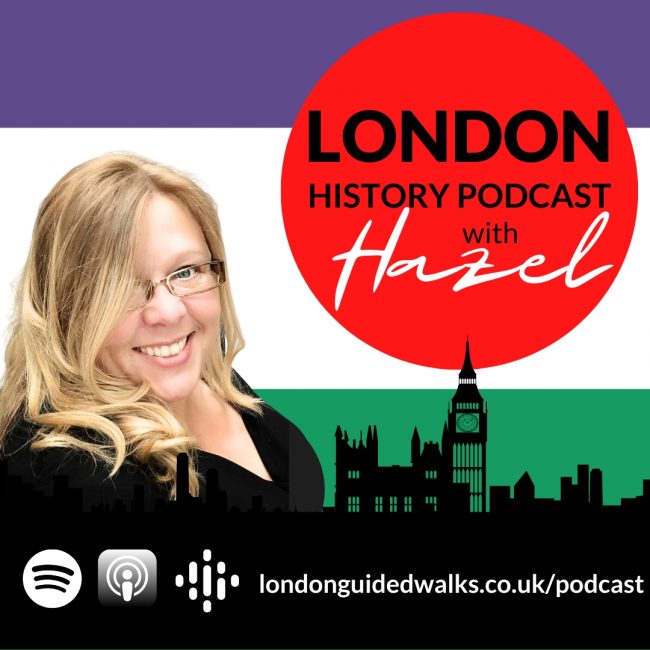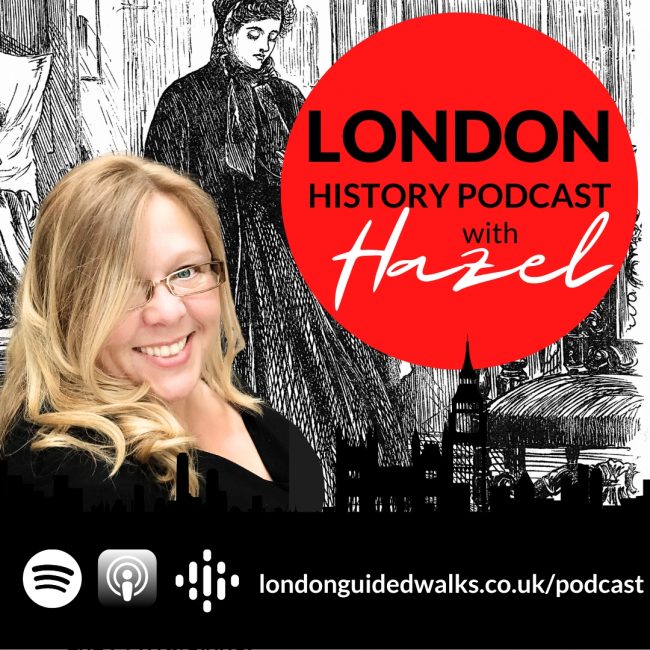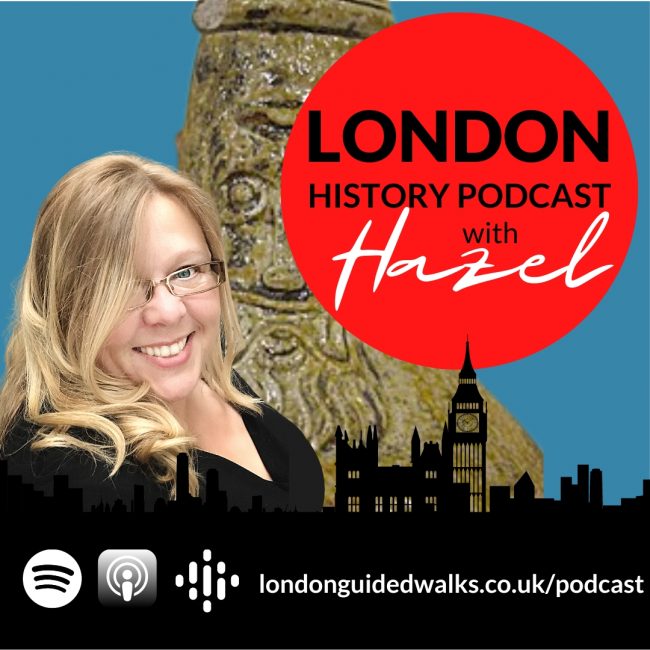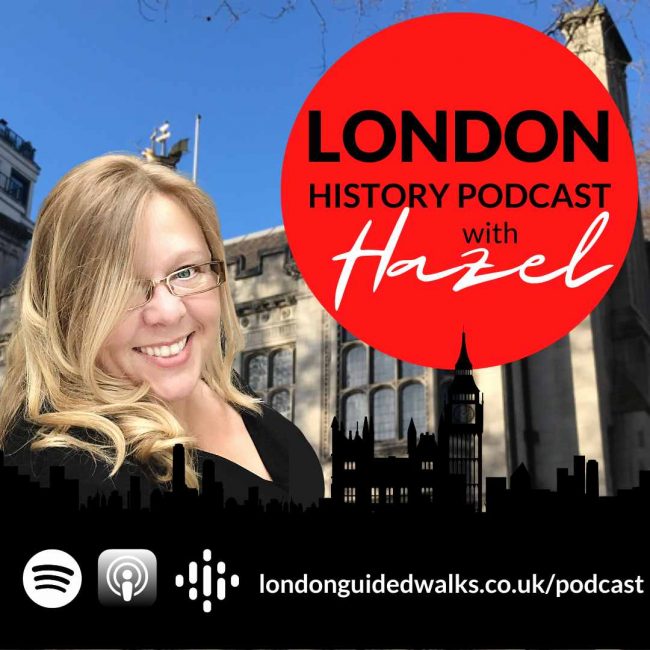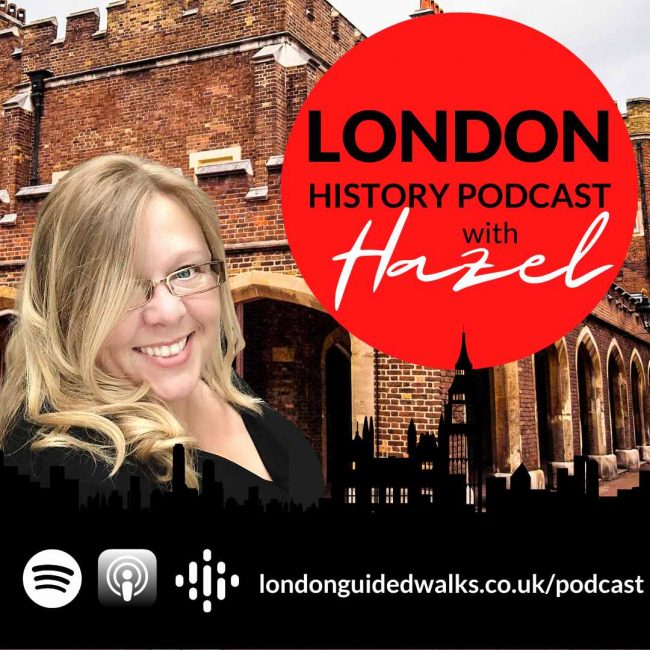 Hazel Baker is an active Londoner, a keen theatre-goer and qualified CIGA London tour guide.
Hazel Baker is an active Londoner, a keen theatre-goer and qualified CIGA London tour guide.
She has won awards for tour guiding and is proud to be involved with some great organisations. She is a freeman of the Worshipful Company of Marketors and am an honorary member of The Leaders Council.
She has been an expert guest on Channel 5’s Walking Wartime Britain
Hazel Baker: Hello and welcome to our London History podcast, where we share our love of London. It’s people, places, and history. It’s designed for you to learn things about London that most Londoners don’t even know. I am your host, Hazel Baker, qualified London Tour guide, and CEO and founder of London Guided Walks.
Each episode is supported by show notes, transcripts, photos, and further reading All to be found on our website. Click on podcast and then select the episode that you fancy. And if you enjoy what we do, then you’ll love our guided walks and private tours that we offer throughout the year.
Get that cup of tea, put your feet up and enjoy. We’ve done it! We have reached triple digits, with this being our 100th episode.
In 2022 alone, we have produced over 500 minutes of new unique content that’s 82% more than other creators in this society and culture category. We have listeners in 67 countries, so hello to all of you!
And we are in the top 10% of shared podcasts globally. We’re also in the top 5% of most followed podcasts. If you don’t follow us, then you can do by clicking on Subscribe in Apple podcasts or Google Podcasts, and of course in Spotify. You can also go to our website, londonguidedwalks.co.uk/podcast.
Enter your email there and we’ll send you an email when a new episode is ready for you to listen to. Our London History podcast is scoring 4.85 outta five, so if you haven’t rated our podcast, you can do so and do that on Apple Podcasts and Spotify. I really love reading your comments. This episode, we take a moment to reflect on the origins of the words we often use and hear during this festive period.
This episode, we take a moment to reflect on the origins of some of the words we often use and hear during this festive period. If you’re looking for a way to get your history and language fix all in one go, then stick around. We’ll look at how some words such as ‘Christmas’ and ‘Yuletide’ first entered our vocabulary – as well as exploring other words associated with Christmas, that of food and drink, and in songs.
To have us navigate through these Christmas words is Danny Bate, a PhD student at the University of Edinburgh, someone who specialises in historic linguistics. Interested in Philology which is the study of language in oral and written historical sources.
Website | Twitter
[00:02:55] Danny Bate: Hello. Hi, Hazel. Thank you so much for having me.
[00:02:57] Hazel Baker: Not at all. I’ve been looking forward to this one because it’s a little bit different, isn’t it?
[00:03:04] Danny Bate: Yes, you could say that. I think it is a bit different, but different in a good way.
[00:03:08] Hazel Baker: One of the things when I’m doing my tours is people are absolutely fascinated by languages, how things have changed when we’re talking about maybe Shakespeare or how certain street names have gotten their names or indeed areas of London as well. And of course it’s Christmas time (ho, ho, ho). so it makes sense for us to have a look at some Christmas themed vocabulary. So I think what do you think about starting with the actual word of Christmas?
[00:03:39] Danny Bate: Ah, it’s the perfect place to start. So it makes sense to start at the beginning. It is a very good place to start. Christmas is a wonderful word.
It is a fascinating word, a word with a very rich history within English, and also in a sense it’s our words, our us being English speakers. Other languages have their own words with a different history and a different formation to them. So, Christmas, you could call it truly English.
[00:04:04] Hazel Baker: So where do we get, obviously there’s the Christ and the Mass, but how is it, how have we come to create that word?
[00:04:13] Danny Bate: Yeah it has a long history. It’s been a part of the language since old English Times old English being the earliest stage of the language. It was by no means the only competitor within the field of Christmasy words at that early stage, it probably not too surprising the competition in old English was Yale which still survives today as yule and Scandinavian languages if people know some Swedish or Danish Norwegian. So things like y it has become the default word in those particular languages, but not the case within English.
And in English, Christmas has one out. Nice and deconstruct as words go. First part of it is Christ. Second part of it is mass, mass being the act of worship especially, within Roman Catholicism and within medieval England. So it’s the mass of Christ really.
[00:05:07] Hazel Baker: So is that more focusing on the service at the time, rather than the actual day or period, 12 days of Christmas.
[00:05:17] Danny Bate: It really does stem from the particular service. And maybe the reason why Christmas comes to dominance and comes to oust words that may refer to the.
In general or even to the season does, which refers to a kind of a longer time of year. Christmas is specifically religious, a single religious event that then gets extended as the religious. Event of the year gets extended and it starts to include other things like the day after Christmas, the 12 days of Christmas leading up to epiphany.
It becomes the default word for the whole celebration. I could speculate that perhaps this is to tie it into other Days of the year, a, as a way of demarcating the calendar. So in a, in the same way we also have in things like Mimus. But really it’s primarily a religious term that has burst its boundaries and now refers to the whole festival rather than just the religious service that people would go to on that.
[00:06:18] Hazel Baker: When was the first time we see the word Christmas being used?
[00:06:21] Danny Bate:Oh, good question. As far as I know, it’s within old English sources. So we are talking about the old English period, roughly up until the year 1100. So in late old English, I think we get the first examples of it, and there it really is.
Like a compound phrase rather than a compound word. It really is Christ’s mass. It looks like a more complicated thing than just this Christmas that we have today, this kind of and snappy word. So yeah. And then we see it flourishing from that point onwards.
Don’t you
[00:06:53] Hazel Baker: I think it’s a little bit strange because we still have the Yu log that would be put on the fire. And we have a Christmas log. But that’s a cake, isn’t it? Yeah,
[00:07:01] Danny Bate: it is. It really is. That’s, it’s funny. But words compete, words can easily compete and try and jostle with each other down the centuries.
And in this particular case I, it makes perfect sense to me to solve. This argy bargy between two words. We should maybe try and specialise them. We distinguish them and use them in certain contexts and certain phrases. That’s quite usual. So yeah, your log and Christmas log is, yeah it makes sense to me.
[00:07:28] Hazel Baker: I know which one I’dprefer to eat.
[00:07:29] Danny Bate: Yes, me too.
[00:07:32] Hazel Baker: Now, last week’s episode was all about the Royal Christmas Message. And we have a very particular saying of Merry Christmas, rather than Happy Christmas or Indeed Happy Holidays. Where does the word come from?
[00:07:46] Danny Bate: That’s an interesting one.
We have this Christmas message and I think it’s extremely appropriate that at least in the UK and perhaps other Commonwealth countries, we have the Monarchs Christmas message, which is televised on tv, extremely appropriate, and I have no idea whether his Majesty King Charles is aware of this, but message is related to Chris Mass.
It’s a long story as to why it may be and somewhat speculative, but it does seem that both the mess in message and the mass in Chris Mass go back to a Latin word, which means to send. So in the idea, the message, perhaps that’s a bit more obvious, it’s the message that’s sent. But even the most strange words seem to come from the last.
Word of the Latin mass, which, or the last phrase in this particular example is something like go. It is the dismissal, like the service is over, to go home. And for some reason that word in the final phrase comes to refer to the mass in general. So it’s a nice little detail there that the Christmas message and Christmas message.
We’ve got two little word siblings side by side.
[00:08:58] Hazel Baker: Fantastic. We Brits have a bad reputation with alcohol or the consumption of . What, we’ve got, joyous Noel. We’ve got feliz Navidad. When you translate them they’re happy, they’re joyous.
Whereas we have Mary is, yeah. What is, which kind of Mary are we really talking about? .
[00:09:18] Danny Bate: That’s a nice one. So Mary again is a, is another English word that has a long history. It goes back to old English in which it would’ve been pronounced something like Maria. So really hasn’t diverged too much.
And yeah, it’s interesting that we’ve settled on that. As you mentioned the monarchs of the late Queen or the current king, we shall see they tend not to say Merry Christmas. This does have these slightly messy connotations to it that, if you have a Merry Christmas, it means it’s a Christmas that’s getting out of hand a bit.
That’s not really the case at all in terms of its history. It means more things like, nice and joyous peace. It’s got some, a bit more serene in its early attestation. So we shouldn’t be afraid to use the word Mary. I will say that much about why we’ve settled on it.
That’s a different issue. And I’m happy to say, outside my remit you’ll need someone perhaps who works in social linguistics or psycho linguistics to tell you why we’ve settled on that particular phrase. But as you mentioned, other languages have settled on their alternative words.
Perhaps as Christmas has become more widespread like a bigger thing than it used to be in years gone by. Perhaps also with mass media where the same stock phrases are being spread around. I don’t know, just speculating, but it is. I agree. It is interesting why we’ve focused on this particular adjective that we don’t use that much beside Christmas.
[00:10:41] Hazel Baker: And so coming back to the Fise Nari dad talking about, as its sister word Nativity. Yeah. Where do we get that from?
[00:10:50] Danny Bate: Yeah. These are all to do with words meaning to be born. So in Latin, Latin unsurprisingly had a word that or a verb that means, To be born. I am born, which would’ve been something like nāscī in older Latin. And this unsurprisingly gives us a whole host of words. I say unsurprisingly, really it’s considering the influence of Latin and considering the importance of. Birth. It’s from this root that we get things like natal, prenatal native as well.
That’s to do with your birth nation. It’s the nation, it’s the people that you are, born into. And among all of these Spanish gets navidad, the birth of Christ over the border in. in France. French has Noel, which has some currency, I think within Anglophone English speaking cultures As an alternative, I think you can somewhat use Noel.
It’s in Christmas carols, for example. And then across another border in in the mighty nation of Wales. It’s nadolig which again comes from Latin. Again, that roots all to do. The birth of Christ.
[00:11:58] Hazel Baker: Yeah. I suppose that feeds into Natale with the Italian and then also the name Natalie, which is born at Christmas.
[00:12:07] Danny Bate: Born at Christmas. There you go. So all a huge connections. English as is often the case, is the bit of the odd one out with this particular word, family. But yes, all sorts of words connected specifically to birth. That’s what the whole thing is about. That’s the whole raison detre.
[00:12:23] Hazel Baker: Oh, fantastic.
I think I, why are we the odd one out? Is this because of Anglo-Saxons and then the Normans and it’s just a whole mix Because this, we are not talking about the odd person isn’t, this is a whole language that’s been adopted.
[00:12:38] Danny Bate: Yeah, English is in so many ways the odd one out and within a general context of Western Europe.
And in many ways it’s really not the odd one out. It does depend on what you are looking at. But it’s true. It does follow its own trajectory as a language, and that’s unsurprising considering the unique historical events. And the. Melting pot of people that have created the United Kingdom.
And the English language. I’m not too surprised when very often English stands alone from a particular trend. It does have a unique history. A particular reason could be that people like the Angles and Saxons, these peoples that went. Building up England was something of a letter r on the scene.
When they’re coming into England, the Roman empires looking a bit peaky. Whereas you could say the Welsh, the Welsh have been here, been around since Roman times. Welsh has a huge influence from Latin. And you could say that maybe the diff different trajectory of English is because it arrives on the scene.
in different circumstances. And from that point onwards, it’s following its own path.
[00:13:46] Hazel Baker: No, that kind of makes sense. , do get guests on tours going, why is it so hard to learn English, and why is it this word and not that word? I’m like I’m so not the person to ask.
[00:13:57] Danny Bate: Even I would struggle with some questions.It breaks my heart sometimes. It is a tricky language to learn. I have taught English and I have respect. Enormous respect for English learners. I really do. One of the
[00:14:09] Hazel Baker: words that you mentioned was Noel , used in a lot of us songs and of course is also a name. There are other words that are quite predominant in some of them, especially Victorian Christmas carols.
Rejoice, for example.and that is linked to Joy. It is indeed.
[00:14:27] Danny Bate: Tell us a little bit more. No. So all of these words have a long association with Christmas. It is meant to be joyful. It is meant to be a celebration. And this goes back to our earliest sources for the celebration of Christmas.
Words like joy. I I believe come from Latin gal. Which is a verb in Latin. It means to rejoice or to be glad. Wonderful verb. And some specific sound changes have gone on. It’s gone through the mangle of French and become in modern French and joy in English.
, it’s also present in another hymn, a hymn that is somewhat popular despite being sung in Latin. I should say that I love Latin, but it may not have the broad appeal which would be Gaudete. I forget. Yeah. Oh, I love that one. I know. Me too. Yes, I know. It’s a really old hymm.
It’s perhaps one of the oldest Christmas hymns that we have record for. And I love it. I love all sorts of versions of it. I forget which eighties band, I can’t remember who covered it, but there is one particular thing.
[00:15:29] Hazel Baker: We’re both too young for that .
[00:15:30] Danny Bate: I do try to catch. And yeah. So it’s a wonderful hymn and yeah surprisingly something a bit more modern, like the 19th century ‘Joy to the World’ and gaudium they share a theme and they also share an etymological connection, which I find quite pleasing.
[00:15:46] Hazel Baker: And when we are singing these, are we supposed to know these connections?
[00:15:50] Danny Bate: Oh no. That’s fine. You don’t need to know the connections to speak the language. That’s not necessary at all.
I will only say for myself at least, it can be interesting to know them and it can be very helpful. Set out my stall. But I’m a great believer that knowing the links between languages can also be very practically helpful for learning them. So if, for example, you are trying to tackle Latin, which I know is a, is quite a task, appreciating that there’s a connection between the English word joy and say the verb galera, which you may have to learn for, for whatever you’re translating it could be quite useful. Yeah, you don’t have to know them though.
[00:16:26] Hazel Baker: Another thing that we have, which you’ve pointed out is the old Saint Nick. Everything’s old, isn’t it? Looking back at old times. . Wh why are we so obsessed with old?
[00:16:36] Danny Bate: I don’t know. I suppose it’s because Christmas is a lot of traditions. Christmas is a sort of an old time of year where we are reflecting back onto the year. In some cases, Christmas genuinely is old. Where you have, for example, a feast day, the day in which you are particularly celebrating may have changed. So for example here at least slowly in Western Europe, Spreading out.
We had a calendar change where we switched from the Julian to the Gregorian calendar, which led to a sort of a leap forward in time. And this led to an old Christmas day. There is an old Christmas Day, which I suppose would’ve been would still be in January. This old Christmas day is still celebrated, for example, by a lot of Orthodox Christians.
So people in Russia, Christmas is. For us and for them the secular month of January. And I suppose also there’s an island off the coast of Scotland. The really remote one, I think it’s St. Kilda where they also keep this older date. The theory being that the news reached them very slowly about the new date.
So yeah, there is also an old Christmas day that you may choose to celebrate if you wish. A very pleasing collection, at least is that this root old, it’s very core bit of vocabulary in English is also present in the. World that may sound a bit strange. You think of the world as being a very concrete thing while the word old is a more abstract quality.
But that’s really to do with the history of this particular compound world. Once upon a time had a much more metaphorical meaning; it was more to do with existence and the lifespan of an individual. So this again goes back to old English, in which world something would’ve been pronounced, something like Al.
If you wanted to be concrete, if you wanted to talk about the planet on which we stand, then that would be mid and the art which you may recognize as mid. That, that is, I was say, it sounds very lured with the rings. It does sound very well. Tolkien had to get it from somewhere . Yeah. So that’s that’s mid guard in that in, in that way.
So that’s that specific place. And so I, I mentioned this only because it’s yet another very pleasing connection back to things like joy to the world where we have this word and there’s old embedded into it.
[00:18:55] Hazel Baker: Now you said we’re old.
[00:18:58] Danny Bate: We old would be something like the age of man or the or man’s lifespan, something like that.
[00:19:04] Hazel Baker: So it’s big stuff, isn’t it? It’s heavy.
[00:19:08] Danny Bate: Very much but old English poets love this stuff. Oh, yes. Loved it. Yes,
[00:19:12] Hazel Baker: I bet they did.
[00:19:13] Danny Bate: Couldn’t get enough
[00:19:14] Hazel Baker: No, there, there was one thing that I had to double take when I was reading one of your blog posts about the mag. Now you can, you get on your Christmas cards, you get, you see the three old wise men. But magi has a rather magical meaning.
[00:19:29] Danny Bate: It does, yeah. Very nice choice of words there. Magi or in the singular in Latin will be something like Magos is the origin of magic. Which is a rather wonderful thing. So yes, the Magi in a magical time of year, it’s all very suitable. This goes back all the way, I believe, to a Persian word.
It’s not especially clear the, these, his, these biblical figures. The wise man is not. , especially clear where they’re supposed to have come from. I think all that matters is that they come from very far away. , which sort of highlights the significance of the event, crossing. Crossing the desert is no mean feat back in the back in those days. Still isn’t. And think this particular word that gets used for them has a Persian origin. And it’s all to do with like wise men sages, you could say, philosopher would be another translation for them.
And as well as giving us this particular very specific word for these biblical characters. . It also does also give us the word magic through Greek and then through Latin, and eventually down to English. So very appropriate.
[00:20:31] Hazel Baker: Fantastic. I think that, does that then tie in with them doing the whole stargazing and that, didn’t they predict this and suddenly when something comes true, that’s gotta be quite magical and quite powerful. Isn.
[00:20:43] Danny Bate: Exactly. No, they really were. And all of these different fields and ways of doing science would’ve been connected. It’s not as if we, it’s not as if they had to perform magic.
It’s by, by virtue of themselves, they were learned wise men that they could do it all. So that’s come down to us at least in English, specifically for performance of the Mystic Arts. But at the time , they would’ve just been learned men, learned Scholars would’ve seen the stars, would’ve read the signs and read the importance correctly, and decided that this was and we better go.
[00:21:16] Hazel Baker: Yeah. And then into history. They were written. Indeed. Yeah. So for the listeners, you remember that the three wise men bring gifts to the baby Jesus. So gifts of gold and also frankincense. What is frankincense? What does it.
[00:21:30] Danny Bate: Frankie? Yes, it’s a good point actually. We take these things for granted.
Gold. We’re pretty good on, we’re pretty clear on gold. We’ve got a vague idea about this, but do you might expect gold, silver, and bronze? These are three things that we understand quite well, but no, we have these three things. Frankincense is a substance, it’s a naturally forming substance that I believe is used for burning and for therefore producing this nice.
I think it’s very specific about where it comes from Southern Arabia, although I might have to check that. And then hence you have this trade in these sort of precious substances up the Red Sea and into the Holy Land. So it’s. Frankincense was a big deal. It was, very important thing.
Not sure what it would’ve been called in the languages of that area at that time, but the English word at least goes back to French. So it’s something like Frank Incense. It’s incense. It’s stuff that you burn specifically. Pure or it’s frank in the sense of very abundant and rich incense.
So it’s a good translation for whatever the original word was. In the Greek and Thetic languages this is, again, extremely appropriate as a Christmassy word. because incense may not be too surprising to learn that it goes back to in candid, which is a Latin word, it means to in to burn or to burn very well.
That’s the origin also in English. In Sendry Barnes, which unfortunately is just something that London knows all too well about. And yeah, so again, you can take it one step further and say that the kind of, the underlying word in Latin is can which just simply means to burn. And hence words in English like candle and canal, abra chandelier all these kind of words as.
Very appropriate that we have frank consents, which is something nice that you burn and candles, which is also something Christmasy and Nice that you burn.
[00:23:28] Hazel Baker: Oh, isn’t that fantastic? I’d never made that connection before with the chandeliers and the candle. Yeah. And of course we have Frank Candles as well, don’t we?
[00:23:37] Danny Bate: We do, we do have Advent candles very appropriately. There’s traditionally four of them in the ad, advent wreath and then an extra one for the great Day itself. And yeah, again, talk about a word with lots of connections. Wow. Advent is huge by virtue of its Latin origin.
So in the same way that frankincense we can say has this Latin. At its heart advent does as well, and it’s a super important one. It’s or venire, depending on your preferred pronunciation of Latin. And that means to come or to arrive somewhere. So super important.
As you can imagine, that’s a pretty basic bit of vocabulary in most languages. By framing it in those terms. Perhaps you can think of other connections starting to appear. Words like words like adventure, for example. Also was about coming to places.
[00:24:29] Hazel Baker: Linking it back to Christmas, you’ve got the Advent calendar as well.
Yes, of course. Fort Masons. . Each Christmas is made into the biggest advent calendar, and each window has a door with a number on. And then of course, when it hits the 7th of December, the seven lights up. . And someone asked me on my Christmas lights, walk this way. You catch me? What does advent mean?
And I automatically, I said, oh, it’s counting down to, but I thought, has that, is that just a reaction or is that something I knew. Have been able to remember
[00:25:01] Danny Bate: it. I think that’s the general sense.
[00:25:03] Hazel Baker: What does advent mean?
[00:25:04] Danny Bate: Yeah it means arrival really. It’s about the arrival or the, if you would, arrival not in terms of these, like the finished act, but more like the anticipation, like it’s still ongoing.
When we have , advent, which again was another Latin word, Aus is more to do with the arrival or the. In the sense of a long process. So Advent is a sort of spiritual time where we look forward to the coming of Jesus. That’s both in the sort of the historical sense where real time is counting down, but also in the sort of spiritual sense.
Christianity is very much about Jesus Christ entering into people’s lives. And advent is when you anticipate what you look at, look forward to it. So yeah it’s the. .
[00:25:48] Hazel Baker: So you talked about Jesus coming into people’s lives. What about a Jo Old fellow who comes into people’s houses on Christmas Eve?
[00:25:56] Danny Bate: Yes, indeed. Santa
[00:25:57] Hazel Baker: Claus. Santa Claus. Yep. Now our red and white outfitted guy is thanks to the marketing department of Coca-Cola. But he is older than that, isn’t he?
[00:26:08] Danny Bate: He really is. Although it’s only fair to say that he’s a man with multiple genealogies. He is the product of different cultures and he’s quite a man with a fairly complex history.
And you can receive this in the name itself and you especially. The different names for this particular figure, this very real figure of course in different languages and in different, say dialects of the same language. He is, at least for me, being British, he’s still Father Christmas.
Santa Claus is something that I acknowledge, but nonetheless, he’s first and foremost part of Christmas. And I think that’s not a trivial point because Santa Claus, which. It, really it, dominates in America is connected to the specific ingredients that went into the United States of America, as many people know.
Santa Claus is from Sin Cla is Saint Nicholas, but through Dutch, that’s the thing. And Dutch, through the Dutch presence in the East in the Northeast USA, New York state. Absolutely. Which used to be new Amsterdam Yeah. Yeah. Has has continued to exert a very distinct influence on North American in English.
And then, North American English has then spread out, and hence why, despite the fact that we in the UK are geographically much closer to the Netherlands and to Dutch, bizarrely, we again, get this word and this term that has a Dutch origin coming from the West into the uk, thanks to the Americans.
Yeah, it’s an interesting sort of Santa Claus and Father Christmas, how it’s it’s a sign of the different histories of these of these two great Englishes
[00:27:43] Hazel Baker: linking back to what we were saying before about old, and we’d call him old Saint Nick. He’s been with us. From the beginning.
[00:27:49] Danny Bate: He has, he really is.
He is old St. Nick, which I think is a delightful name as well. So yeah it’s great and you can read a lot into it as well. It may go perhaps underappreciated, but Dutch, this language of Europe has had quite an effect on the vocabulary of English. Multiple reasons why that may be.
Geography is one and the fact that all the Christmas traditions are forming really within the medieval period where at least in Western Europe Dutch speakers are, they’re on the up. Thanks to trade, for example speakers of Dutch and low German. That’s not what we call, that’s not German, that’s low German, sort of separate language spoken in what’s now Northern Germany.
This single language is, the speakers of that language are doing enormously well for themselves. Thanks to things like the Hands Attic League, this is great trading. That’s spreading their trade and goods and language around the north and Baltic seas. In that regard, it’s no wonder that we have this Dutch influence creeping in.
Not only do we have the Dutch to thank for Santa Claus, they’ve also given us things like, And slay which makes sense. It’s a fairly watery country, so it makes sense that this is gonna freeze over and they’re gonna have to have some way of getting around during winter. And also for older listeners Brandy brand brandy is Wunder vein.
It’s a burnt wine in Dutch. It’s like a sort of a former compound that’s been squished into just brandy. Yeah, we’ve got a lot to thank them.
[00:29:23] Hazel Baker: I must admit, I do drink a bit more brandy at Christmas than any other time of year. I think It’s the law, isn’t it?
[00:29:28] Danny Bate: It is the law.
[00:29:32] Hazel Baker: And it goes into the cooking, you know it course it does.
Yeah. The alcohol’s burnt off.
[00:29:33] Danny Bate: Exactly. It’s, you’ve already got it out anyway.
[00:29:35] Hazel Baker: And that, I suppose that links to the rather bizarre drink of eggnog,
[00:29:41] Danny Bate: eggnog. I know. I’m not a fan, I have to admit eggnog
[00:29:44] Hazel Baker: It’s a texture for me, just puts me off. Agreed. But where does the nogg come from (the egg is a bit obvious). But where’s the nogging come from?
[00:29:50] Danny Bate: A very good question. And with no easy answer, I have to say. This whole field of etymology, it’s sometimes it can produce. Fairly unsatisfactory answers. Some words just defy easy, derivation, easy speculation about where they come from. From the record, at least from the record of all the English dialects and accents and things that have been collated over time, it seems to have a east anion origin.
So shout out to East Anglia. That’s where I’m from. The proud county of Norfolk. A nog seems to be some sort of strong alcoholic drink probably. . It doesn’t sound very pleasant to be mixing egg and beer, but maybe this is a word that sort of lost its beery connotations and has come to mean just, spirit or alcoholic drink in general and then becomes eggnog with the addition of egg.
I think that’s the idea, but it’s a curious drink with a curious ety.
[00:30:51] Hazel Baker: It isn’t it? There’s a pub in Mayfair called the Last Running Footman. And he was literally the last running footman in Mayfair and he had a cane. And the cane itself had a, a B’s head, silver, B’S head. And when you opened that head of the cane, he was strong.
And also the other compartment had egg whites. Wow. And so I’m thinking now, was this a DIY egg wall? Because he’s a, he’s basically running in front of the horse and carriage. He’s over six feet tall, he is showing that his master’s on the way, and then when his master goes for dinner or whatever he can’t.
It’s like a chauffeur, isn’t it? You have to sit and wait. So he ha his sustenance is this 45 wine and egg
[00:31:37] Danny Bate: whites. Wow. Oh wow. What a drink. . What a character as well. And for someone
[00:31:44] Hazel Baker: That’s six foot, you need calories, don’t you? You run, you do. Particularly, maybe it was his version of an eggnog there.
[00:31:52] Danny Bate: Wow. That’s a wonderful story. God, what the rich history of London. It’s incredible. .
[00:31:57] Hazel Baker: And that’s bizarre, isn’t it? Its, so we we have brandy, which obviously again, then goes with brandy sauce on the Christmas puddings. And the mince pies. And then we have brandy cream as well.. What about the word cream in itself?
[00:32:12] Danny Bate: It’s a great word. It’s a word that despite the, you know, the fairly humble substance of cream, it’s a word with very lofty origins. It is in fact derived from ancient Greek via Latin and via French. And though, Extra steps may show why it’s been a bit muddled and a bit altered over history.
But it goes back to ancient Greek khrîsma, which is charism, it’s charism. It’s the stuff that you use in baptisms and coronations, and it’s what it’s what you use to anoint people. And this is a kind of a drastic I think example of some sort of a basement or devaluation of the word where, despite this kind of, this substance with very specific purposes, it seems to have diminished over time to just mean.
Fatty liquid fatty substance. And then, cream specifically i.e you know the milk-based substance in what they might get from cows. The interesting story, that does happen. Words, can. Be heightened, they can be made much more positive and much more loftier in their meaning.
But the opposite can happen too. And this is wonderful. It’s very appropriate that we should be consuming cream at Christmas in whatever form you choose. Because we have which is this ancient Greek word that’s the. that you anoint with, that’s the noun because of the ma ending the verb itself, right?
Second meaning, not quite not quite so nice. But yeah, again, it’s the stuff that you anoint with and it, unsurprisingly, it goes back to that verb now. past participle, the form of the verb. The one who is anointed, the one who has been anointed is Christos Christ.
Oh. So Cream and Christ bizarrely have this connection through their shared Greek origin. Jesus Christ, as people may well know, Jesus is the name. That’s a personal human name. It Is fairly common. In the first century and in that part of the Middle East Christ is more like a title or an epithet.
He’s Christos, he’s the anointed one, the one who has this special status from God. It’s actually a translation or perhaps an approximation of a Hebrew word. The Hebrew word itself may also be fairly familiar to people. The Messiah. So again, we’ve got the anointed ones coming in, so Cream, Christ, Messiah.
There you go. Welcome to the world of etymology. That’s fantastic. really great. I can’t take any credit. It’s all language, not me. .
[00:34:52] Hazel Baker: No, you’ve said it so well. That actually makes so much sense. Thank you, Donny. I think we’ve had a wonderful adventure. Here we go. I’m gonna add these words in.
Thanks for the Christmas. Now of course you’ve got the candles, we’ve got the cream, we’ve got the word Christmas as well. And of course, this essence of , and celebration and which is of course I suppose the main part of Christmas. Now we don’t focus on the ,, the doom and the gloom, and everything’s dark and cold outside.
We want to spend time with our loved ones in a joyous way. . Danny, thank you so much.
[00:35:25] Danny Bate: Thank you for having me. It’s a pleasure. I relished this opportunity to share these little word facts. I don’t normally need such a setting and such an excuse. Normally they normally just come out anyway.
So this is, this has been wonderful. Thank you so much for having me.
[00:35:38] Hazel Baker: And if you are wanting to listen to more Christmassy episodes,
Christmas-themed podcast episodes:
Episode 99: Royal Christmas Messages
Episode 98: Christmas Puddings Throughout History
Episode 75: The Christmas Cracker – a Victorian Invention
Episode 74: Christmas in 1950s and 1960s London
Episode 35: A Tudor Christmas
Episode 34: London’s oldest shops food and drink
I would encourage you to listen to, this is London’s. Oldest shops for food and drink, and they’re lovely ideas for yummy Christmas presents. And now is the time to bid Farewell for 2022. Thank you so much for joining me this year, and we will restart our London History podcast in February, 2023 because I have a little book I need to finish.
That’s all for now. Have a very merry Christmas and a healthy and happy new year.


 Hazel Baker is an active Londoner, a keen theatre-goer and qualified
Hazel Baker is an active Londoner, a keen theatre-goer and qualified 